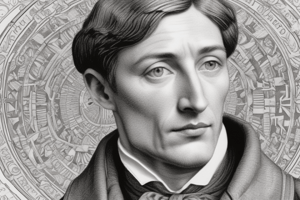Podcast
Questions and Answers
What type of transformations are included in topological transformations?
What type of transformations are included in topological transformations?
- Reflections and rotations
- Compression and expansion
- Stretching, shrinking, twisting, bending (correct)
- Translation and dilation
What concept did Gerard Desargues introduce when considering the intersection of parallel lines?
What concept did Gerard Desargues introduce when considering the intersection of parallel lines?
- Ideal point (correct)
- Intersection point
- Origin point
- Zero point
In projective geometry, what theorem states that if two triangles are perspective from a point, then they are also perspective from a line?
In projective geometry, what theorem states that if two triangles are perspective from a point, then they are also perspective from a line?
- Theorem of Desargues (correct)
- Pythagorean Theorem
- Fermat's Last Theorem
- Euler's Theorem
What does the study of vanishing points and perspective focus on in projective geometry?
What does the study of vanishing points and perspective focus on in projective geometry?
What does the field of topology primarily aim to discover and analyze?
What does the field of topology primarily aim to discover and analyze?
What are the origins of the term 'Geometry' according to the text?
What are the origins of the term 'Geometry' according to the text?
What is the term for a strip with a symmetric pattern?
What is the term for a strip with a symmetric pattern?
In geometry, what is the term used for a rotationally symmetric object with an angle of rotation θ?
In geometry, what is the term used for a rotationally symmetric object with an angle of rotation θ?
Which of the following is considered a magical value that consistently appears in nature according to the text?
Which of the following is considered a magical value that consistently appears in nature according to the text?
What skill is supported by understanding number patterns, as mentioned in the text?
What skill is supported by understanding number patterns, as mentioned in the text?
What is the word for the smallest angle that would preserve a figure when rotated, according to the text?
What is the word for the smallest angle that would preserve a figure when rotated, according to the text?
What does 'F2 (Step)' involve according to the text?
What does 'F2 (Step)' involve according to the text?
What is the characteristic postulate of Hyperbolic Geometry?
What is the characteristic postulate of Hyperbolic Geometry?
What is the key difference between Hyperbolic and Elliptic Geometry?
What is the key difference between Hyperbolic and Elliptic Geometry?
Who is known to have contributed in many fields of mathematics?
Who is known to have contributed in many fields of mathematics?
What is the title of the work published by Lobachevsky in 1829?
What is the title of the work published by Lobachevsky in 1829?
What is the sum of the interior angles of an elliptic triangle?
What is the sum of the interior angles of an elliptic triangle?
Which mathematician is Hungarian?
Which mathematician is Hungarian?
Study Notes
Projective Geometry
- Gerard Desargues is considered the father of projective geometry.
- He revisited Euclid's second postulate and considered parallel lines intersecting in a plane, calling this the ideal point.
- Theorem of Desargues: If two triangles are perspective from a point, then they are perspective from a line.
- Projective geometry includes the study of vanishing points and perspective.
Topology
- Jules-Henri Poincaré published "Vorstudien zur Topologie" (Introductory Studies on Topology) in 1895.
- Topology is about discovering and analyzing the essential similarities and differences between sets and figures.
- Topological transformations include stretching, shrinking, twisting, or bending a figure without merging points.
Geometry
- Geometry comes from the Greek words "geo" (earth) and "metron" (measurement).
- Geometry has contributions from ancient Greeks, including the discovery of irrational numbers like √2, pi, and the golden ratio (phi).
Symmetry
- Symmetry is prevalent in mathematics, nature, art, and design.
- Reflection symmetry: points of a figure are equally positioned about a line (axis of symmetry).
- Radial symmetry: points on a figure are uniformly situated around a central point.
- Angle of rotation: smallest angle that preserves the figure when rotated.
- Order of rotation: a rotationally symmetric object with an angle of rotation θ has an order of rotation 360/θ.
- Translation symmetry: a figure can be drawn in its entirety by taking a portion and shifting it along an axis.
Frieze Patterns
- There are seven frieze patterns:
- F1 (Hop): Translation symmetry only.
- F2 (Step): Translation and glide reflection symmetry.
- F3 (Sidle): Translation and vertical reflection symmetry.
- F4 (Spinning Hop): Translation and rotation symmetry.
- F5 (Spinning Sidle): Translation, glide reflection, and rotation symmetry.
- F6 (Jump): Translation, horizontal reflection symmetry, and rotation.
- F7 (Spinning Jump): Translation, horizontal, vertical reflection, and rotation symmetry.
Hyperbolic and Elliptic Geometry
- Nikolai Ivanovich Lobachevsky and Janos Bolyai were key contributors to hyperbolic geometry.
- Johann Carl Friedrich Gauss contributed to many fields of mathematics.
- Hyperbolic geometry: assumes the negation of Euclid's 5th Postulate, considering a circular disk instead of a plane.
- Characteristic Postulate of Hyperbolic Geometry: Through a point P not on a line l, there exists at least two lines passing through point P parallel to line l.
- Elliptic geometry: there are no parallel lines, and any two lines must intersect; the sum of the interior angles of an elliptic triangle is more than 180.
- Characteristic Postulate of Elliptic Geometry: Through a point P not on a line l, there exists no line passing through point P parallel to line l.
Studying That Suits You
Use AI to generate personalized quizzes and flashcards to suit your learning preferences.
Description
Test your knowledge on Gerard Desargues, the father of projective geometry, and his contributions to mathematics and engineering. Explore concepts such as parallel lines intersecting in a plane, ideal points, and the Theorem of Desargues. Learn about projective geometry and its study of vanishing points and perspective in mathematics.


